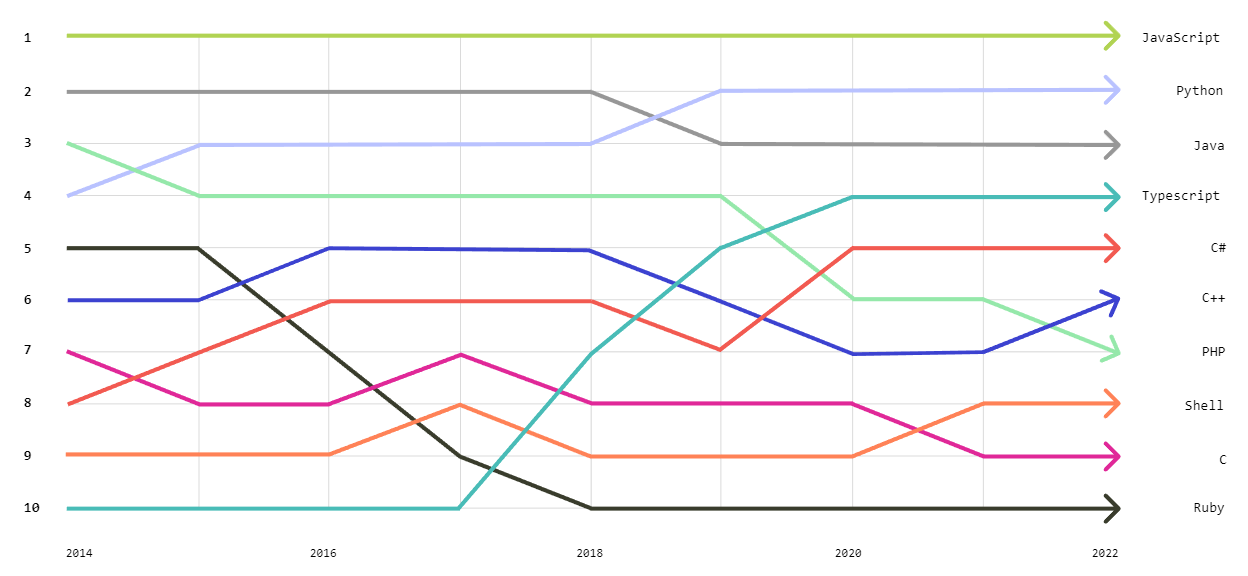Both are used for programming purposes. Both are flexible and enable you to create many different digital products. However, there is a big difference between Java and JavaScript. Let’s have a closer look at JavaScript and Java and see what you need to know about them.
When you take a look at the comparison of the most popular programming technologies, you will see that both Java and JavaScript are very popular. However, when it comes to popularity, the comparison of Java vs. JavaScript can have just one winner, and it’s JavaScript. Why? We’ll get to that in a moment.

What is the difference between Java and JavaScript?
We could shortly say that these are simply two different programming technologies that happen to share a similar name. The main difference is that Java is a compiled programming language, while JavaScript is an interpreted programming language. What does it mean?
Java’s code has to be compiled, meaning you need to take your source code and convert it to bytecode (which, in turn, is a form of instruction designed for efficient execution). In simpler words, you cannot just run Java’s code and enjoy your new app or digital platform. On the upside, Java is platform-independent, meaning you can use just one code base to run your apps on any computing platform.
On the other hand, JavaScript is much easier from many perspectives, especially for beginners. With JavaScript (JS), programmers can benefit from something called just-in-time compilation, meaning they don’t have to compile the code. It immediately works in the browser, and that’s why it’s called an interpreted language. Today, the process of interpretation happens automatically and is almost unnoticeable to the developer working on the code.
JavaScript vs. Java: What are these two technologies used for?
The truth is both JavaScript and Java are extensively used in the online world. Front-end web developers use JavaScript to build websites and web applications dynamically. In fact, JavaScript is a great tool for tasks such as validating application forms or updating specific pieces of page content without having to update the entire page at the same time. We could even say that, probably, without JS, the internet would be filled with websites that are static and just display text.
Interestingly, JS works with both the front end and back end. Back-end developers use a JavaScript sub-category called Node.js to build the backend architecture. The Node.js framework enables developers to handle data updates from the front end and build scalable web products capable of processing multiple simultaneous user requests, among other things.
Read also: Orchestration: the machines can do the work
And what about Java? This technology is widely used in IT, especially concerning:
- Developing mobile and web apps
- Developing games
- Creating cloud-based applications and platforms
- Creating IoT and big data technologies
So, in essence, you can create pretty much any digital product using Java. Take a look at this infographic to see how universal Java is:

Source: https://medium.com/javarevisited/top-7-compelling-characteristics-of-java-development-df6d9a14d450
Pros and cons of Java and JavaScript
Pros of Java
- Easy to learn and understand
- Object-oriented programming technology: Java is secure and can maintain even large code base
- WORA (Write Once Run Anywhere): Java-based apps can be run anywhere
- High-level language: Java is similar to English and has just a few syntaxes that are easy to remember
Cons of Java
- Relatively slow
- Requires a lot of memory
- Paid for commercial projects
Pros of JavaScript
- Easy to learn and understand
- Fast in implementation
- Versatile – can be used in many different projects
- Comes with many frameworks to streamline work
Cons of JavaScript
- Security: JavaScript is executed on the client side so it can be breached and exploited for malicious purposes
- Limited browser support: Different internet browsers sometimes interpret JavaScript code differently, so you need to check you code in at least several of them
- Lack of debugging feature means dealing with potential problems takes more time
Summary: Java vs. JavaScript
You now know the major differences between Java versus JavaScript. Which technology is better? There is no one-fits-all answer – it all depends on the project. Usually, it’s best to consult this question with your web development partner before making the final decision. Whichever technology you choose, though, both are flexible and versatile, so they are potentially good for your project.
Read also: Open source, enterprise or enterprise open source? How to choose a CMS




